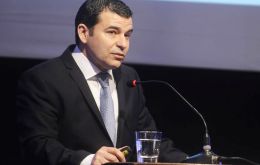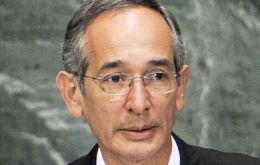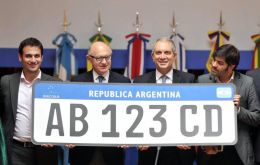MercoPress. South Atlantic News Agency
Latin America
-
Saturday, October 11th 2014 - 06:06 UTC
Santos confirms he authorized FARC leader to attend peace talks in Cuba

Colombian guerrilla leader Rodrigo Londoño has made secret government-authorized trips to Cuba several times in the last year to meet with his team of negotiators as part of peace talks to end 50 years of civil war, Colombian officials said.
-
Saturday, October 11th 2014 - 06:04 UTC
Brazil testing patient suspected of Ebola infection; another 64 in quarantine

Brazilian Health Minister Arthur Chioro said on Friday the results of tests on a patient suspected of Ebola infection would take 24 hours. At a press conference in Brasilia, the minister assured the situation was under control and that proper precautions had been taken to isolate the patient.
-
Saturday, October 11th 2014 - 03:24 UTC
Special Master Pollack to meet with Argentina's and holdout lawyers next week

A United States court-appointed mediator said on Friday he would hold a meeting next week between lawyers for Argentina and 'holdout' creditors suing the country in a longstanding dispute over defaulted debt.
-
Saturday, October 11th 2014 - 03:22 UTC
Morales confident he will win Sunday's election in all nine Bolivian districts

At an event to mark the closing of his campaign ahead of Sunday’s elections, a self-assured Evo Morales told Bolivians that he will win all over the country and will even take the opposition’s bastions of support in the east.
-
Saturday, October 11th 2014 - 01:47 UTC
UN Human Rights Council calls for immediate release of Venezuelan dissident Leopoldo Lopez

The United Nations adopted a resolution Wednesday decreeing the Venezuelan government should immediately release Leopoldo Lopez, the opposition leader who has been imprisoned for almost nine months in connection to the violent protests in Caracas in February.
-
Friday, October 10th 2014 - 05:01 UTC
Latam headed for a third year of foreign trade stagnation, reports ECLAC

Latin America and the Caribbean's foreign trade will experience its third year of stagnation in 2014, because of minimal growth in exports and a slight decline in imports, the Economic Commission for Latin America and the Caribbean (ECLAC) reported on Thursday.
-
Thursday, October 9th 2014 - 10:36 UTC
YPF goes overseas: signs agreement with Ecuador to recover mature fields

Argentina's state-run energy company YPF closed on Wednesday an agreement with Ecuador's state-owned company Petroamazonas for the enhanced recovery of the mature field of El Campo Yuralpa which will demand an investment in the range of 170 million dollars.
-
Thursday, October 9th 2014 - 08:04 UTC
Colombia and Panama in retaliatory clash over tax haven controversy

Panama on Wednesday rejected its inclusion on Colombia's list of tax havens and said it will take retaliatory action against its neighbor. Panama has “a competitive and sound tax system, and therefore the national government categorically rejects any tax-haven designation,” the Central American nation's Foreign Ministry said in a statement.
-
Thursday, October 9th 2014 - 07:59 UTC
OAS Electoral observation mission in Bolivia for Sunday's election

Former Guatemalan president Alvaro Colom has arrived in La Paz as Chief of the Electoral Observation Mission from the Organization of American States (OAS/EOM) to head the group of 63 people who will observe Bolivian general elections of 12 October.
-
Thursday, October 9th 2014 - 06:08 UTC
Mercosur finally agrees: unified number plates for new cars beginning 2016

The five full members of the Mercosur trade bloc will use unified number plates for their 0km vehicles starting in 2016, Argentine Foreign Minister Hector Timerman announced on Wednesday from San Martín Palace in Buenos Aires city.
